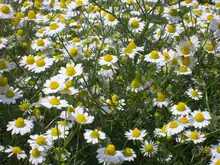camomile
English

Matricaria recutita
Alternative forms
- camomille, chamomille (rare)
- chamomile (botany, pharmacology)
Etymology
From Middle English camamille, first attested 1265, from Old French camomille, from Late Latin camomilla, from Latin chamaemelon, from Ancient Greek χαμαίμηλον (khamaímēlon, literally “earth-apple”), from χαμαί (khamaí, “on the ground”) + μῆλον (mêlon, “apple”). So called because of the apple-like scent of the plant.
Pronunciation
- (Received Pronunciation) IPA(key): /ˈkæ.məˌmaɪl/
Audio (RP) (file) - (General American) IPA(key): /ˈkæ.məˌmaɪl/, /ˈkæ.məˌmil/
Noun
camomile (countable and uncountable, plural camomiles)
- Composite plant with a fragrance reminiscent of apples:
- Matricaria recutita (formerly known as Matricaria chamomilla), German chamomile or Hungarian chamomile, with fragrant flowers used for tea, and as an herbal remedy.
- Synonyms: German camomile, Hungarian camomile
- Chamaemelum nobile (formerly Anthemis nobilis), English chamomile or Roman chamomile, a ground cover with fragrant foliage.
- Synonyms: Roman camomile, English camomile
- Matricaria recutita (formerly known as Matricaria chamomilla), German chamomile or Hungarian chamomile, with fragrant flowers used for tea, and as an herbal remedy.
- Any of several other similar plants. (See below)
- Short for camomile tea.
- 2022 September 27, Barclay Bram, “My Therapist, the Robot”, in The New York Times:
- On another occasion, when trying to brainstorm things I could do to make myself feel better despite all the pandemic restrictions, Woebot suggested I “try doing something nice for someone in your life,” like make a calming tea for my housemate or check in with a loved one. I poured my mum some chamomile: Two birds, one stone.
-
Derived terms
- Cape chamomile, Eriocephalus punctulatus
- corn chamomile, Anthemis arvensis
- dyer's chamomile, Cota tinctoria
- English chamomile, Chamaemelum nobile
- false chamomile, Tripleurospermum inodorum
- field chamomile, Anthemis arvensis
- garden chamomile, Chamaemelum nobile
- golden chamomile, Cota tinctoria
- Moroccan chamomile, Cladanthus multicaulis
- oxeye chamomile, Cota tinctoria
- Roman chamomile, Chamaemelum nobile
- scentless chamomile, Anthemis arvensis
- scentless chamomile, Tripleurospermum inodorum
- stinking chamomile, Anthemis cotula
- wild chamomile, Matricaria discoidea
- wild chamomile, Matricaria recutita
- wild chamomile, Tripleurospermum inodorum
- yellow chamomile, Cota tinctoria
Translations
Matricaria recutita
|
Chamaemelum nobile
|
similar plant
camomile tea — see camomile tea
- The translations below need to be checked and inserted above into the appropriate translation tables. See instructions at Wiktionary:Entry layout § Translations.
Translations to be checked: "plant"
|
Further reading
 Chamomile on Wikipedia.Wikipedia
Chamomile on Wikipedia.Wikipedia  Anthemis on Wikimedia Commons.Wikimedia Commons
Anthemis on Wikimedia Commons.Wikimedia Commons  Anthemis on Wikispecies.Wikispecies
Anthemis on Wikispecies.Wikispecies - camomile at USDA Plants database
- camomile at USDA Plants database
This article is issued from Wiktionary. The text is licensed under Creative Commons - Attribution - Sharealike. Additional terms may apply for the media files.